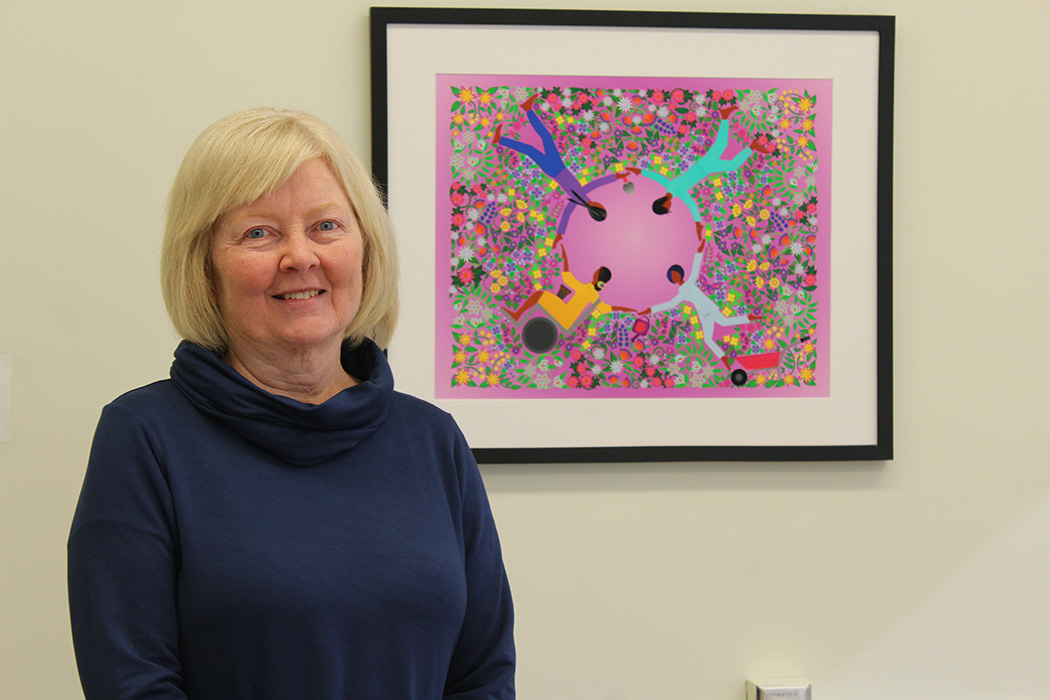
Gayle Restall in front of artwork by Deninu Kue First Nation artist Lisa Boivin that was created for her textbook, depicting the importance of collaborative relationships in occupational therapy.
Professor emerita works to transform occupational therapy
Gayle Restall, professor emerita in occupational therapy at the College of Rehabilitation Sciences, Rady Faculty of Health Sciences, has had an accomplished career focused on research into removing barriers for people in marginalized and underserved communities living with chronic health conditions.
She has received multiple awards over her career, including, in 2023, the Muriel Driver Memorial Lectureship Award from the Canadian Association of Occupational Therapists (CAOT), which is considered the highest honour in occupational therapy (OT) in Canada.
In 2022, she published Promoting Occupational Participation: Collaborative Relationship-Focused Occupational Therapy, a textbook offering a guide to occupational therapy in Canada, co-edited with Dr. Mary Egan, director of the School of Rehabilitation Sciences at the University of Ottawa.
The textbook has been noticed internationally and she has spoken to audiences in Australia, the United Kingdom, Amsterdam and New Zealand.
Originally from Winnipeg, Restall is a UM alumna with degrees in medical rehabilitation and community health sciences. She retired in 2021 but is still involved in research related to anti-stigma approaches for people living with HIV and transforming OT toward justice- and rights-based practices.
Restall recently spoke with UM Today about her ongoing research.
You’ve described your recent work as being focused on transforming OT into a more anti-oppressive practice? Can you describe what this means?
For many decades OT emphasizes the importance of collaborating with individuals, families, groups and communities in decisions about their own care. However, like many health-care professions, we’ve often neglected to fully consider the ways that social, political and economic contexts influence what people can do. We’ve also neglected to recognize the influence of our own world views and those of the dominant culture. This can lead unintentionally to practice in ways that can be oppressive, particularly toward those who have been socially racialized, excluded and stigmatized. The structure of our health and social systems make it difficult for therapists from dominant social positions to recognize the perpetuation of oppression and discrimination. At the same time, therapists from equity-deserving groups are acutely aware of the perpetuation of these injustices.
My work is aimed at supporting therapists to recognize oppressions when they occur and to creatively identify new ways of building and sustaining collaborative relationships, so they consistently practice in ways that promote justice, equity and rights.
In our textbook, Dr. Egan and I emphasized the need to evolve OT practices toward ones more intentionally inclusive of, and relevant to, the diversity of people and communities that therapists work with. Importantly, we emphasized the unique position of Indigenous peoples in Canada and the implications of the ongoing legacy of colonization on OT practices.
You’ve also been involved in a digital storytelling project in collaboration with Nine Circles Community Health Centre and REACH Nexus, a national initiative focused on HIV-related research. What are some of the goals related to this work?
We’ve been doing a series of digital stories with Indigenous women and two-spirit people around their lived experience of HIV, particularly in the context of stigmatizing experiences, with guidance from Elder Albert McLeod. My role is providing opportunities for people to tell their own stories, highlighting what they want to emphasize. These powerful stories have strong messages about how the storytellers have been supported in their journeys and provide words of hope for people who are newly diagnosed. One of the most consistent messages has been the importance of connecting with culture and peers for their personal well-being. They’ve also found ways to benefit their communities, support peers and educate communities about HIV and AIDS.
What did receiving the Muriel Driver Memorial Lectureship Award from CAOT mean to you?
It was humbling to have my work recognized by my peers and I’m grateful to colleagues and mentors who nominated me. A tradition of receiving the award is the opportunity to give a lecture on a topic that is important and significant to the recipient. In May 2024, I chose to talk about occupational therapists’ individual and collective responsibilities to change the settler colonial structures in our society that create and perpetuate inequities and injustices for many people. We need to be vigilant. We all need to hone our moral imaginations and courage to act in ways that create a more just country and world.






